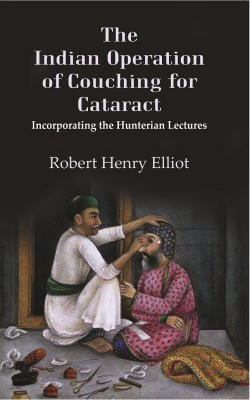The Indian Operation of Couching for Cataract: Incorporating the Hunterian Lectures(Paperback, Robert Henry Elliot)
Quick Overview
Product Price Comparison
About The Book: The collection of fifty-four eyeballs, on which the work for my Hunterian Lectures was founded, I have had the honour to present to the Museum of the Royal College of Surgeons. I think I am justified in claiming that it is unrivalled, and likely to remain so. At the suggestion Of Sir John Bland Sutton, I have endeavoured so to write the chapter on patho logy that it may furnish a guide to any who care to study the subject within the walls of that museum. At the same time, I have striven to make it readable and of interest to those who have no such Opportunity. In this the photographs have greatly helped me. As I have already said, I have given nearly a quarter of a century's intermittent work to elucidate these problems, which I felt were of wide interest, not merely to India or to the East alone, but to the whole civilized world. During the last two years I have devoted a very large proportion of my spare time continuously to the subject, but it is so immense and so far-reaching that I feel I have left much unfinished. On every hand fresh problems open up, till there seems no limit to what might be done, given time and opportunity. This operation of couching, so old that its origin is lost in the dim mists of antiquity, has still much that is new to be learnt for the seeking. There are many of the younger surgeons in the East who could carry the work much farther if they would, and who would be a hundred-fold repaid if they did. About The Author: Robert Henry Elliot (1864-1936), Born 23 August 1864, the second son of major John McDowell Elliot, of the 4th King's Own Royal Regiment of Foot. He was educated at Bedford School and at St Bartholomew's Hospital, where he gained the preliminary scientific exhibition and was awarded the Bentley prize for reports of cases from the wards in 1888. Entering the Indian Medical Service he was gazetted surgeon-lieutenant on 30 January 1892, and at Netley he was given the Montefiore medal and scholarship in military surgery and the Maclean prize in clinical medicine. He was put on sanitary duty in India 1892-94, and served on the NE frontier in the Chin Hills campaign in 1892-93 and received the medal and clasp. From 1904 to 1914 he was superintendent of the Government Ophthalmic Hospital, Madras, and professor of ophthalmology at the Madras Medical College, acting for a time as secretary to the Surgeon-general of Madras. He rose in rank, becoming surgeon-captain 30 January 1895, major 30 January 1904, lieutenant-colonel 30 January 1912, until on 13 April 1915 he retired and settled in London. Here he acted as reporter on glaucoma operations at the International Congress of Medicine in 1913; was Hunterian professor of surgery and pathology at the Royal College of Surgeons for the year 1917-18 and was chairman of the navy and military committee of the British Medical Association from 1917 to 1922. In 1919 he became lecturer on ophthalmology at the London School of Tropical Medicine and ophthalmic surgeon to the Prince of Wales Hospital. From August 1919 to 1925 he was examiner of surgical instruments at the Indian Store Department. He married Eva Catherine. Isabella (d 1925) the daughter of Deputy Surgeon-General Hutchinson, IMS, and by her had three sons. He died at Barnet on 9 November 1936; having practised during the latter part of his life at 54 Welbeck Street, WI.


